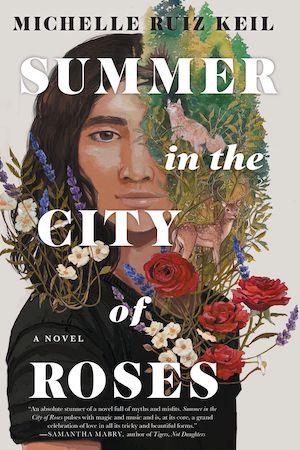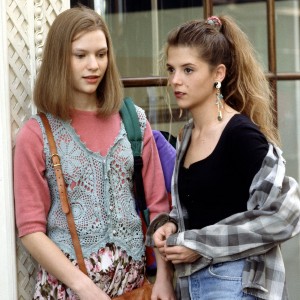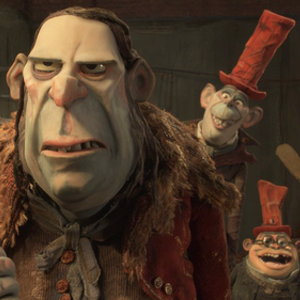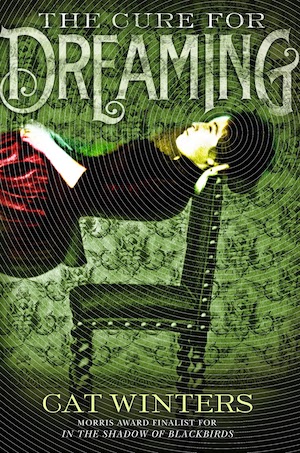
About the Book
-
Author:
- Michelle Ruiz Keil
- Voices:
- Cis Boy
- Cis Girl
- Non-Binary
Cover Story: Art Class Self-Portrait
BFF Charms: Maybe x2
Talky Talk: Historical Fict—No, Magical Realism
Bonus Factors: Portland, Oregon, LGBTQ, The ’90s
Anti-Bonus Factors: Teen “Boot Camp,” Awful Grownups
Relationship Status: Conflicted
Cover Story: Art Class Self-Portrait
I don’t mean this as a knock in any way, but I’m getting a “the assignment is to share yourself in collage form” vibe from this cover.
The Deal:
Siblings Iph and Orr have always had a good relationship with each other, and their mother, but their father is a bit of an outside entity that just doesn’t understand. When their mother leaves for an artists’s retreat, their father takes the opportunity to send Orr away to a camp that promises to get him in line. But there’s nothing wrong with Orr, and he soon escapes the camp and falls in with a group of Portland musicians. Meanwhile, Iph leaves home to find Orr (and to get away from her father) and finds a new sort of family on the city’s streets.
BFF Charms: Natalie Imbruglia

Both Iph and Orr are unique individuals who I would have loved to be friends with when I was an actual teen. But I honestly don’t know if I would have been open-minded enough to hang with them back then. So my conflicted feelings are more about my lack of self-awareness (and my own personal hangups) than Iph’s and Orr’s.
Swoonworthy Scale: 6
While out searching for Orr, Iph meets George, a young queer person who’s had a falling out from their family and spends their days protecting Portland’s vulnerable citizens. Iph’s immediately attracted, but George has history that they’re still not fully over.
And Orr’s never been one to find anyone interesting, really, but there’s something about one of his new friends that’s causing some surprising emotions to emerge.
Talky Talk: Historical Fict—No, Magical Realism
Set in the 1990s, Summer in the City of Roses is a slice of a time of life that doesn’t feel historic to someone like me, who lived through it, but certainly would to today’s teens. Ruiz Keil writes the era with a deft hand, giving the book a very specific (grungy) feeling. But the mix of magical realism and contemporary plots is where the book falters. The first ⅔ of the book is one thing, and the latter ⅓ something completely different. Had they been more mixed throughout, the book would have made more of an impact—and a far less confusing experience.
Bonus Factor: Portland, Oregon

Portland has been through a lot lately, and Summer in the City of Roses is a nice love letter to the city—but a love letter that doesn’t shy away from calling attention to some of the not-so-great parts (specifically the lack of diversity) and of Oregon as a whole. Although I was born in California, I spent most of my formative years in Southern Oregon and consider it my home state. I love visiting my family who still live in Portland and visiting many of the places mentioned in the book (particularly Powell’s—all the heart eyes). I’m always going to be excited when it features in a book, but I absolutely appreciate that Keil didn’t gloss over the darker bits.
Bonus Factor: LGBTQ+

Obviously, queer folk have been around since time began. But it’s nice to see a “historical” book that includes various aspects of and folks from the community in such a respectful manner, and not in the “oddity” kind of way that some historical books fall prey to.
Bonus Factor: The ’90s

They’re popular again, did you know? I certainly can’t escape it every time I walk into Target …
Anti-Bonus Factor: Teen “Boot Camp”
Iph and Orr’s father send’s Orr to a rehabilitation camp to “fix” him. But there’s nothing wrong with Orr, and certainly nothing that a “kidnap kids in the middle of the night, handcuff them, and cut off all of their hair” kind of camp can fix.
(Although it’s never explicitly said, I think Orr might be autistic. Again, there’s nothing wrong with that.)
Anti-Bonus Factor: Awful Grownups

See above. Iph and Orr’s dad is an utter fool not to see how amazing his kids are, and he fractures their relationship irreparably when he sends Orr away. And it’s not until far too late that he realizes and fesses up to his mistake. So I suppose he’s not all bad, given that he does eventually realize, but any parent that resorts to what essentially amounts to child abuse just because they don’t understand their child gets written off in my book as someone who doesn’t deserve to be a parent.
Relationship Status: Conflicted
I was really digging you, Book, until things got strange. And I would have liked the strange parts, had they not seemingly come out of nowhere. I’m just not sure your two personalities and my own one really mesh that well, all told.
Literary Matchmaking

If you’re looking for a magical realism novel that feels a bit less fractured, try any of Anna-Marie McLemore’s books, such as The Mirror Season.

For more 1990s magic, check out Megan McCafferty’s The Mall.

And for another vacation to Portland—and another crappy father who wants to change his child to fit his version of normal—visit Cat Winters’s The Cure for Dreaming.
FTC Full Disclosure: I received a copy of this book from Soho Teen, but got neither a private dance party with Tom Hiddleston nor money in exchange for this review. Summer in the City of Roses is available now.